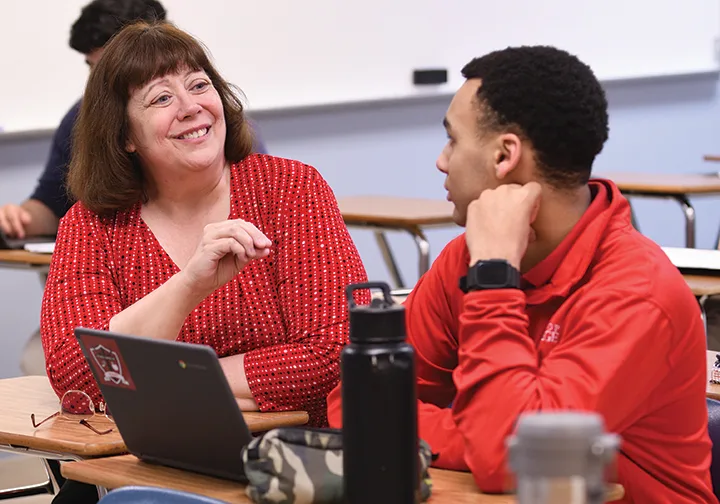
by Jill Ragar Esfeld
jill.esfeld@theleaven.org
ROELAND PARK — Last spring, Bishop Miege High School debate and forensics coach Melissa Reynolds received a 7th Diamond Award, one of the highest honors a coach can achieve as part of the National Speech and Debate Association (NSDA).
Out of more than 4,000 active coaches today, only two have received a 7th Diamond, and in the 98-year history of the NSDA, only 42 coaches have been awarded the honor.
It’s a big deal.
In light of this accomplishment, it’s hard to believe Reynolds was once a timid eighth grader who bombed her first speech class.
“I was very shy and overly self-conscious,” said Reynolds. “I took a speech class and got all the negative things I already thought about myself kind of confirmed.
“So when it came to high school, I refused to sign up for speech and debate.”
The debate coach at Reynolds’ high school also happened to be the youth director at her church, and he pressured her mercilessly to take his class.
“My sophomore year, I ended up taking it out of spite,” she said, “to get him to shut up and leave me alone, because he would realize how bad I really was.
“But instead of getting my revenge on him, I learned a lot about myself and about communication.”
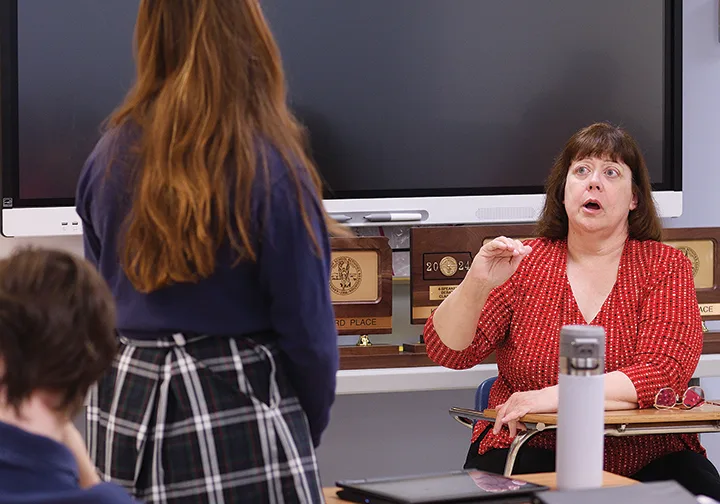
Reynolds continued to improve her speech skills, with the intention of studying engineering in college. But when she was completing her ACT packet, the career-goal question stopped her cold.
“For some reason I couldn’t fill that out,” she said. “I just felt stuck.”
After a long discussion with her youth director/coach, Reynolds went home and did what anyone facing a life decision should do.
“Before I went to bed, I prayed for guidance,” she said. “I woke up the next morning, picked up the ACT packet and wrote down ‘secondary speech and theater education.’
“I’m not one of those people who feels like God talks to me directly, but this was a billboard-in-my-face kind of feeling.”
Reynolds knew she had a calling to pass on the skills she had learned.
“I felt like a missionary,” she said, “because I knew there were lots of people like me, and I wanted to bring the good news to those people.”
After more than 35 years at Bishop Miege, she has fulfilled that mission.
Diamond awards are based not only on longevity, but student performance — the number of points acquired by the coach’s debate and forensic teams.
Bishop Miege’s squad is not that large, but it is just that good.
Debate teacher wanted
Reynolds’ road to Bishop Miege began with another God moment.
She and her husband were moving from Texas to Kansas so that he could attend law school.
“My aunt lived in Olathe,” recalled Reynolds. “She cut out a want ad in The Kansas City Star and mailed it to me.
“All it said was ‘Debate teacher wanted, Bishop Miege High School’ and a phone number. She wrote next to it ‘I’ve heard really good things about this school.’”
Reynolds called the phone number and drove from Texas for an interview.
“She was the first person I hired back in 1987 when I came to Miege,” said former president Dr. Joe Passantino, who is now the foundation president for Bishop Miege.
“Obviously, she stood out in terms of her background and her character,” he said. “She took over and the record of success is just amazing. It speaks for itself.”
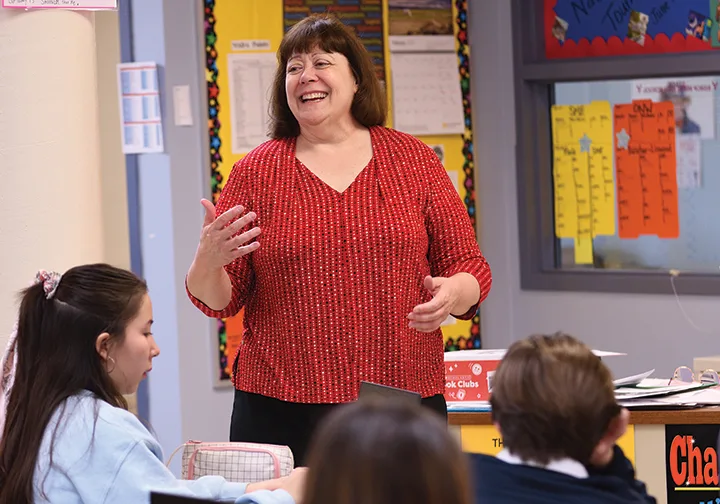
The stats are impressive; Bishop Miege is no stranger to state championships. But the true success of Reynolds is measured in the success of her students.
“They go in about a million different directions,” she said. “Lots of attorneys, lots of doctors, a couple of geologists, lots of engineers, an editor for Gentleman’s Quarterly. Many of them have their Ph.D.s and are professors.
“That same work ethic that helps them be successful in debate, helps them in college and in their careers. They’re pretty much dynamos.”
Passantino’s son graduated from Bishop Miege in ’94, a product of Reynolds’ program.
“She so effectively models hard work, respect, humility, teamwork, on and on,” he said. “Real life skills that she passes on to her students.”
Those skills have enabled his son, an engineer, to work successfully with clients.
“There’s no doubt in my mind that everything he did in debate helped him get to that point,” Passantino continued. “I always tell Melissa he’s an engineer, but he’s one that can communicate.”
Nieky Allen understands that quip. A software architect with a bachelor’s and master’s in software engineering, he calls Reynolds’ program “easily the most transformative class I’ve ever taken.”
And he calls Reynolds his second mom.
“My mom knows that, and she’s OK with it,” he said. “She knows how much Reynolds means to me, and how much she’s done for me.”
Allen remembers Reynolds’ coaching style as being a perfect balance of “compassion and not cutting people slack.”
“I don’t think very many coaches or teachers strike that balance the way she does,” he said. “It’s definitely something I always aim to mimic with my engineering teams today.”
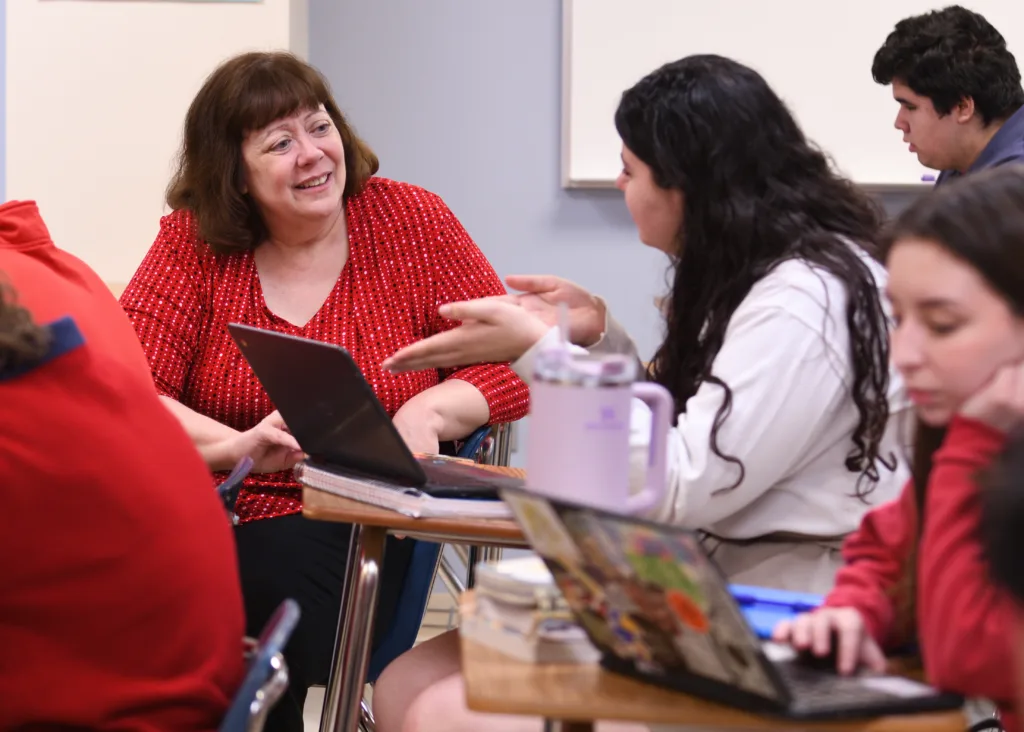
Allen credits Reynolds’ high standards for giving him excellent speaking skills and the ability to think on his feet. But most importantly, he knows how to research and validate facts.
“Reynolds was, like, ‘I don’t care what you bring me,’” he recalled. “‘If it’s not from someone who knows what they’re talking about, you may as well light it on fire.’”
2016 Miege graduate Victoria Gomerdinger has always had the heart of a scientist, and so, in high school she was more studious than outgoing.
Reynolds understood.
“Ms. Reynolds’ support helped me overcome a lot of the fear of expressing myself, “ she said, “which I am incredibly grateful for.
“She did an amazing job realizing the different talents of each student and would nurture our strengths, as well as support us to improve our weaknesses.”
Gomerdinger has since attended Yale University and is currently finishing her Ph.D. in chemical engineering at the Massachusetts Institute of Technology. As a scientist, she values Reynolds’ lessons in breaking down complicated information to the level of your audience.
“Being a successful communicator is not about how elaborate the verbiage is,” she said, “but rather, if you can break down your thoughts and express them in a way that enables your audience to understand and appreciate your point.
“For me, personally, this has proven to be an invaluable lesson.”
First impressions
Both former students agreed that, though at the time they thought Reynolds was over-the-top with her dress and behavior expectations at tournaments, they now appreciate what she taught them about first impressions.
“Oh my, if you walked in with a clip-on tie!” said Allen. “I kind of knew how to tie a tie. But now, I can tie like three different knots blindfolded — because I had to do it in the pitch black in some tiny bus in the middle of nowhere.
“It’s the kind of thing that sticks with you.”
Gomerdinger agreed that Reynolds’ expectations were high — but worth it.
“We were to always look presentable for debate and forensics tournaments — suits and dresses/skirts — with pantyhose! And we should always be respectful to our opponents.
“It was an important life lesson in how to carry yourself professionally and show that the event at hand does matter.”
Reynolds still has those high standards.
“It’s everything,” she said. “The first impression, how you look, your posture, how you’re dressed. Ethics and fair play. The way you present yourself.
“If you want someone to take you seriously, you’ve got to look like you’re taking it seriously.”
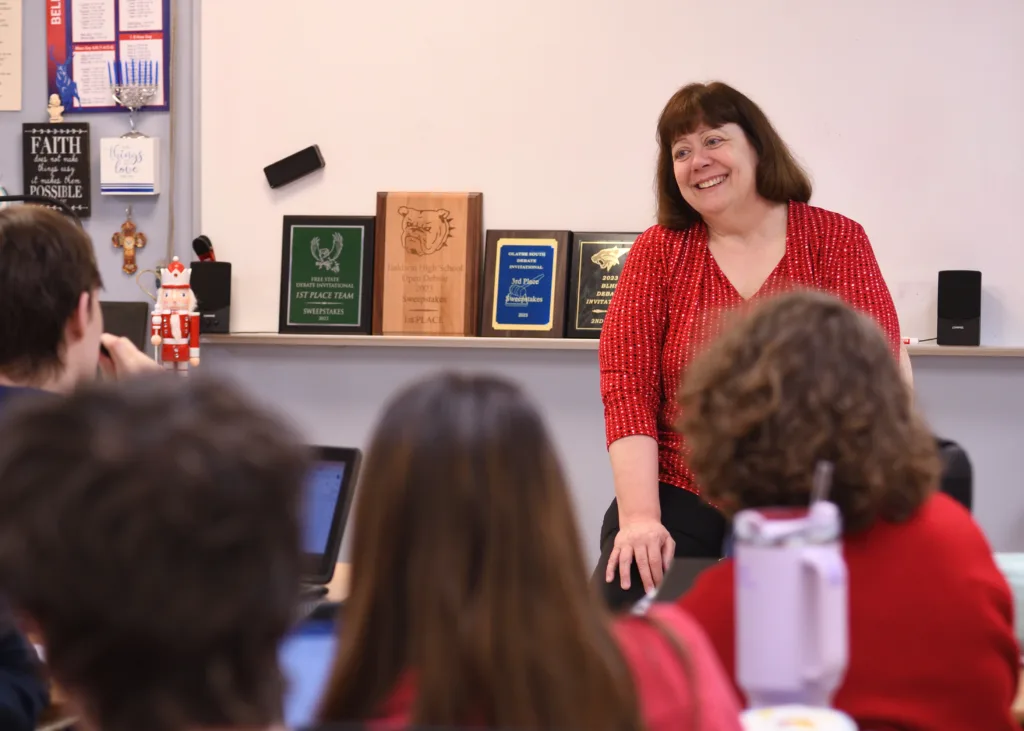
Though tournament success is important, Reynolds’ true priority is instructing students to use the gift of speech in light of their Christian values.
“The voice has a lot of power,” she said. “What can you do with that knowledge, that logic — with that ability to express your thoughts?
“Use it effectively, but use it cautiously to do good, for the rest of your lives.”
No regrets
As talented squads leave Bishop Miege to make their way in the world, Reynolds doesn’t spend much time with regret.
“As soon as one group leaves, another group comes along to get you ignited again,” she said. “Some kids are so sharp and so articulate you think, ‘Wow, what can we do with that?’
“And then there’s the quiet one over in the corner and you think, ‘OK, we’re going to fix that, we’re going to get past it.’”
And what does Reynolds think of being a 7th Diamond coach?
“It’s icing on the cake,” she said. “I’ve never been concerned about the accolades I get. I just love seeing them succeed and seeing them grow, and seeing what they end up doing with their lives.”






